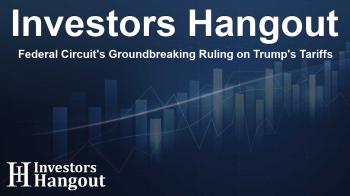Federal Circuit's Groundbreaking Ruling on Trump's Tariffs

Federal Circuit's Decisive Ruling on Tariffs
In a significant legal development, the en banc U.S. Court of Appeals for the Federal Circuit recently determined that former President Trump's unilateral attempts to impose tariffs under the International Emergency Economic Powers Act (IEEPA) are, in fact, unlawful. This ruling brings to light important arguments raised by the New Civil Liberties Alliance (NCLA), which contends that the IEEPA does not empower the president to levy tariffs.
Key Findings of the Court
The Federal Circuit's ruling comes as a validation of the NCLA's amicus curiae brief highlighting that the IEEPA does not authorize any tariffs. This landmark decision reaffirmed the lower court's ruling from the U.S. Court of International Trade, which emphasized that the actions taken by President Trump exceeded any authority granted by the IEEPA. While the court did not conclusively state whether some tariff power exists under IEEPA, it strongly rejected the extensive tariff measures enforced during Trump's presidency.
Legal Precedence and Rationale
The ruling is significant not only for its implications on international trade but also for the boundaries it sets on executive power. The Federal Circuit noted that the IEEPA does not explicitly mention tariffs, duties, or similar financial impositions, resonating with NCLA's textualist argument. This observation underscores the notion that prior to Trump's administration, no president had sought to employ IEEPA for tariff imposition, making this ruling even more critical in its implications for future governance.
Next Steps for the NCLA
The NCLA aims to further challenge the legality of tariffs purportedly enacted under the IEEPA. In light of the recent judgment, the NCLA's legal team is optimistic about the prospect of securing a court ruling that invalidates any tariff deemed unconstitutional under the Act.
Implications for Future Tariff Actions
As a result of the recent ruling, the appeals court has made it clear that it supports comprehensive injunctions against unlawful tariffs. This set of rulings not only serves to halt the emergency tariffs but also underscores the potential need for broader reform in how tariffs are enacted. By ensuring that any future tariff actions undergo congressional approval, the ruling aims to restore checks and balances between the executive and legislative branches of government.
Statements from NCLA Leadership
NCLA representatives have expressed their satisfaction with the Federal Circuit's decision. Andrew Morris, Senior Litigation Counsel at NCLA, articulated that while they welcome the ruling, they are hopeful that future decisions will go further in affirming that IEEPA does not permit any tariffs.
Continued Advocacy for Civil Rights
Mark Chenoweth, President of NCLA, remarked on the need for a universal injunction against such tariffs, emphasizing that past courts have consistently upheld the notion that the IEEPA does not allow the president to bypass congressional authority. This ruling is seen as a victory not only for legal precedent but for upholding constitutional integrity.
Conclusion on Emergency Tariffs
This ruling by the Federal Circuit marks an important moment in the ongoing discussion surrounding executive power and tariffs in the United States. By invalidating these emergency tariffs, the court has set a significant precedent that will likely influence future legal approaches to tariffs and the overarching authority of the executive branch.
Frequently Asked Questions
What did the Federal Circuit rule regarding Trump's tariffs?
The Federal Circuit ruled that Trump's emergency tariffs imposed under the IEEPA are unlawful, emphasizing that the Act does not allow for such tariff powers.
What is the main argument from the NCLA regarding tariffs?
The NCLA argues that the IEEPA does not grant the president the authority to impose tariffs, only allowing for certain emergency actions against foreign threats.
What implications does this ruling have for future executive actions?
The ruling signals a tightening of executive power regarding tariffs, highlighting the need for congressional approval for such actions.
Will there be further legal challenges regarding tariffs?
Yes, the NCLA plans to pursue more legal actions to ensure that any tariffs enacted unlawfully are invalidated.
How does this ruling affect public governance?
This ruling reinforces the checks and balances between the legislative and executive branches, ensuring decisions regarding tariffs require congressional consent.
About The Author
Contact Olivia Taylor privately here. Or send an email with ATTN: Olivia Taylor as the subject to contact@investorshangout.com.
About Investors Hangout
Investors Hangout is a leading online stock forum for financial discussion and learning, offering a wide range of free tools and resources. It draws in traders of all levels, who exchange market knowledge, investigate trading tactics, and keep an eye on industry developments in real time. Featuring financial articles, stock message boards, quotes, charts, company profiles, and live news updates. Through cooperative learning and a wealth of informational resources, it helps users from novices creating their first portfolios to experts honing their techniques. Join Investors Hangout today: https://investorshangout.com/
The content of this article is based on factual, publicly available information and does not represent legal, financial, or investment advice. Investors Hangout does not offer financial advice, and the author is not a licensed financial advisor. Consult a qualified advisor before making any financial or investment decisions based on this article. This article should not be considered advice to purchase, sell, or hold any securities or other investments. If any of the material provided here is inaccurate, please contact us for corrections.

